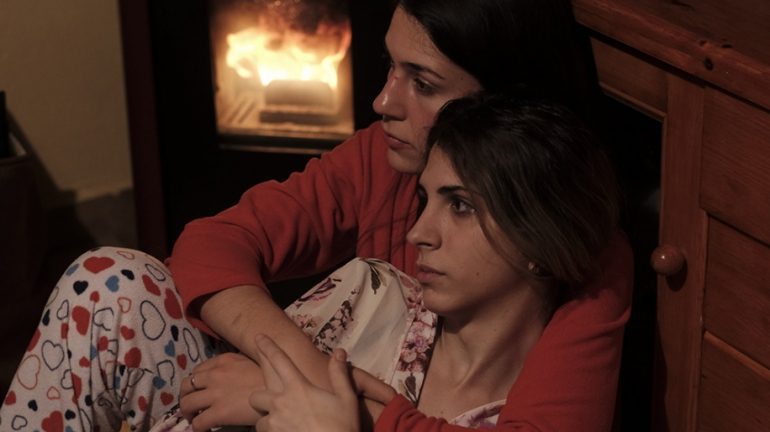Parts one, two and three of our coverage of the 2021 BFI London Film Festival are also available on the site.
Sediments

At last year’s festival, we were treated to the magnificent docu-drama, Bloody Nose, Empty Pockets, about a Nevada taproom destined for closure. In my review, I treated the film as if a documentary and entirely true. Since then I’ve learned it incorporated fictional elements to a greater degree than I’d thought, though I’m still not certain how to regard or categorise the film. A similar dilemma confronts me with Sediments, Adrian Silvestre’s new documentary following six members of the I-vaginarium collective, a Spanish support network set up between trans women, as they make the road trip from Barcelona to Leon for one of their member’s birthdays. As the film is shot almost entirely through static cameras, I don’t see how it could be purely documentary, yet that is how it is described in the supportive materials and every cast member is credited as themselves and their performances, if performances they be, are extremely naturalistic. Regardless of the level of fiction involved, Sediments is still a superb piece, and arguably the best film of the festival so far.
As the six women travel through Catholic rural Spain, they visit quarries, caves and churches, drop in on loving family members, and debate the issues they each combat in their daily lives. They’re a diverse group of different ages and socio-economic backgrounds, with very different experiences, attitudes and personalities, and one thing the film does is provide a crucial reminder that besides being trans, trans women needn’t have anything more in common than any other cross-section of society, not even a real common understanding of that one thing that binds them. This leads to friction, principally in the case of Cristina (Cristina Millan), a conservative and frankly rather narcissistic woman who started to transition late in life and whose underdeveloped social skills cast her as the black sheep of the sextet. Whether a fictional creation or a real person presented onscreen, she’s one of the most unique and frustrating characters I can recall seeing on film.
Besides Cristina, there’s the bawdy cancer survivor and former sex worker Yolanda (Yolanda Terol), business-like leader Tina (Tina Recio), collegiate daughter Lena (Lena Brasas), whose pilgrimage home is the reason for their road trip, motherly spiritualist Saya (Saya Solara) and radiant young Alicia (Alicia De Benito). Their interactions are the real joy of the film, providing the uncomplicated pleasures of following six loveable characters as they interact and get to know one another, whether they’re debating the concept of gender as a whole and the difficulties of getting the surgeries they require or just getting high and playing “Never Have I Ever”, a sequence I’d happily have watched unedited. It’s so refreshing to see a film about trans characters that has so little time for trauma, seeing its subjects as real, funny and vibrant people and not vessels for society’s collective guilt. They may discuss the injuries of the past, but the film never gives us a reason to shield our eyes, remaining celebratory throughout without becoming overly positivistic or condescending for a second.
Bantu Mama

Another film that seeks to fracture preconceptions in a celebratory light is Bantu Mama, Ivan Herrera’s drama that takes familiar tropes from mainstream drama and thrillers, but approaches them with a level, undemonstrative gaze that makes them seem deceptively credible. The film looks at the African diaspora in its variety and its commonality, presenting an unlikely culture clash that surprises more with the similarity between the experiences of its characters than with their differences.
The film follows Emmanuele (the film’s screenwriter Clarissa Albrecht), a French-Cameroonian woman on vacation to a fancy resort hotel in the Dominican Republic. However, when she is arrested trying to leave again, it is soon revealed that she has actually been sent there as a drug mule for a dealer back in France. Through a stroke of luck, a freak car accident liberates her and she is picked up by three young orphaned siblings who use their local contacts to help her get back home. It all seems like a contrived setup for a nail-biting thriller as she takes refuge with these non-judgmental kids in a neighbourhood rife with crime—the Capatillo is supposedly the most violent district in Santo Domingo. Its far fetched setup might strain credulity, but the film presents it with such authenticity and is played with such naturalism by the young cast that you find yourself buying it.
The characters are from different worlds, but as common members of the global community of the African diaspora, they soon discover they have more in common than they assume. Emmanuelle is no fish out of water, but a savvy, quiet and affectionate woman who knows this kind of bad situation, and soon becomes a kind of surrogate mother, repaying the kindness of the kids who take her in. Likewise, the kids who take her in also know the score, recognising Emmanuelle as a problem to be resolved, but also as a potential opportunity for escape.
The film presents a cultural crossover between European and Caribbean Africa, with a celebratory Afrobeat soundtrack and lightly, but credibly sketched, characters. At just seventy-seven minutes though, with as slow-moving as it is, Bantu Mama feels like it is only scratching the surface of its scenario. There just aren’t enough dialogue scenes or scenes of conflict to develop the characters. into becoming anything memorable. It’s a film full of moments rather than scenes and doesn’t leave as much impact as it might, despite its laudable themes and messages. It is though, still a tender and empathetic film with its feet on the ground and its head in the clouds, presenting an aspirational portrait of unity and cooperation among members of the diaspora.
Drive My Car

One of the festival’s most acclaimed releases, Drive My Car comes to London already garlanded with awards from Cannes, including a prize for its screenplay, written by Takamasa Oe and the film’s director Ryusuke Hamaguchi, and based on a short story by Haruki Murukami, from his Men Without Women collection. Murakami has seen great success with adaptations to screen, including the mesmeric South Korean thriller Burning, with which this film has many thematic and narrative echoes of sexual jealousy, including the opening image of a naked woman silhouetted against a bluish sunrise. In both films, this woman is the riddle our male lead will spend the film trying to solve. However, Drive My Car is a mellower and more middle-aged film than Burning, without either that film’s taut, Hitchcockian aspirations or much of its hypnotic power. Drive My Car is a sombre character piece, exploring themes of grief, inaction, and living with the passing of a loved one with whom one had a complicated relationship.
The film opens with an extended prologue—it’s a full forty minutes before the opening credits roll—following theatre director and actor Yusuke (Hidetoshi Nishijima) as he goes about his daily life with his screenwriter wife Oto (Reika Kirishima—by coincidence, starring in her second film named after a song from The Beatles’ Rubber Soul album) until he comes home one day to find her having sex with another man. Unwilling to have a confrontation, he quietly slips out and tries to forget the incident, until Oto unexpectedly passes away.
The film then jumps ahead two years, during which time Yusuke has retired from acting. However, he is coaxed back into directing a production of Uncle Vanya and begins rehearsals, in which process he is provided with a driver, the withdrawn Misaki Watari (Toko Miura). Complicating the picture is Koshi Takatsuki (Masaki Okada), the hot headed and disreputable young matinee idol who Yusuke chooses to cast as Vanya, despite, or more likely because of, the fact he suspects he was the man Oto was having an affair with.
One could easily imagine a version of this story that begins with Yusuke’s arrival in Hiroshima and him meeting Misaki, one where all that background detail comes out through the dialogue, but here, we see it all unfold, making the enigmatic Oto a more tangible mystery to the viewer. We see how content she and Yusuke seem to be, making her infidelity all the more unexpected and harder to understand. There’s a line in Uncle Vanya about a wife’s insincere fidelity being worse than sincere adultery, and it’s far from the only time that the scenes we see Yusuke’s cast rehearsing do a lot of the thematic heavy lifting for Hamaguchi. Yusuke’s great method is to cast a multilingual group of actors and have them each deliver their lines in their native tongue, with back projected subtitles for the audience, a process his actors find frequently confounding, but which leads to some of the film’s best moments as the actors occasionally find something special in the process.
Besides the lengthy rehearsal scenes, the bulk of Drive My Car unfolds equally through many one-on-one dialogues between Yusuke and Oto, Misaki, Koshi or one of the play’s producers, who is, along with his mute wife (the play’s Sonya), seemingly the only characters who are genuinely happy with the lives they’ve made for themselves. Both Misaki and Yusuke are both buried in grief for a person who was, in life, a conundrum, and their initially monosyllabic friendship fosters an understanding of one another that is the strongest narrative thread of the film, presenting two characters who seem genuinely lost and in need of some redemptive salvation
Running counter to their relationship though is the presence of the volatile, arrogant and ingratiating Koshi, whose brash behaviour is a stark contrast to the reserved Yusuke and Misaki. At times he seems to admire and respect Yusuke and sincerely envies him in turn; at others, he comes off as a preening, short-tempered womaniser who’s just come along to pour salt on the wound. One could almost see him as a shallower, less charismatic imitation of Steven Yuen’s Ben from Burning.
The whole film is extremely meditative and slow moving, with the occasional light moment of genuine magic, with a candid nocturnal drive being the dramatic high point and momentary eruptions of narrative melodrama and contrivance that the film’s thoughtfulness invites one to forgive. The three-hour running time is a sore point though, for as quiet and underplayed as the piece is, it’s hard to find justification for such indulgence. I fear even the most patient of viewers might find it a trying watch, as it takes the scenic route every time. Drive My Car just about rewards the indulgence of its viewers with some moments that approach a kind of poetic clarity. The writing is consistently intriguing and the performances leave little to be desired (I dare say that as the grief-benumbed Yusuke, Nishijima gives the standout characterisation of the festival thus far), but the film drags itself out, in desperate need of a more efficient route to its destination.



